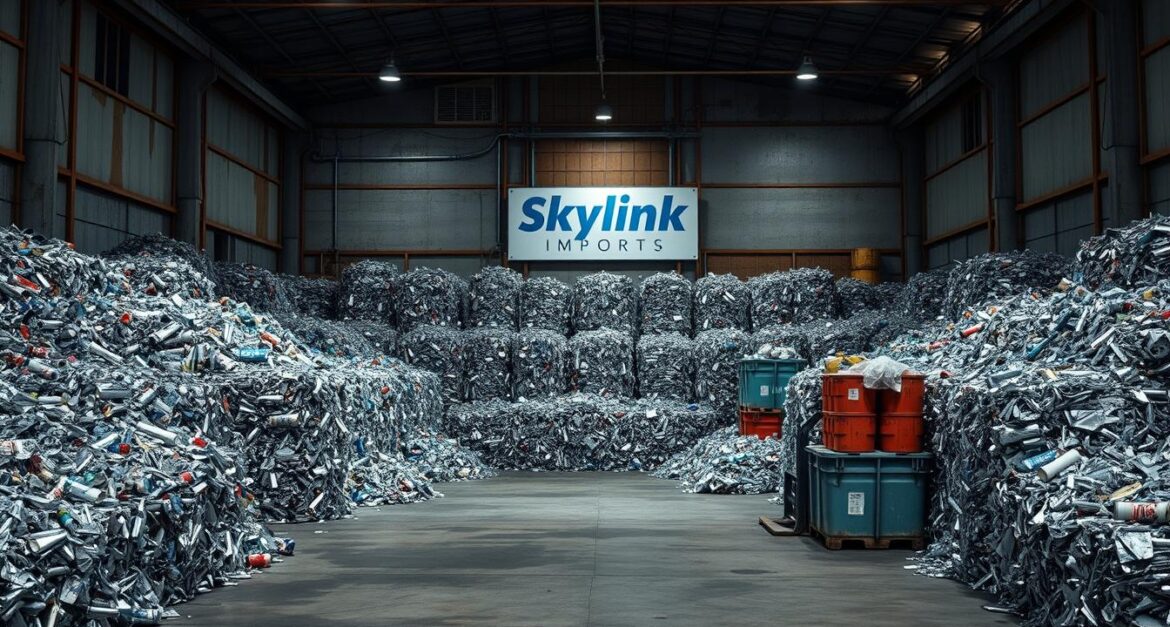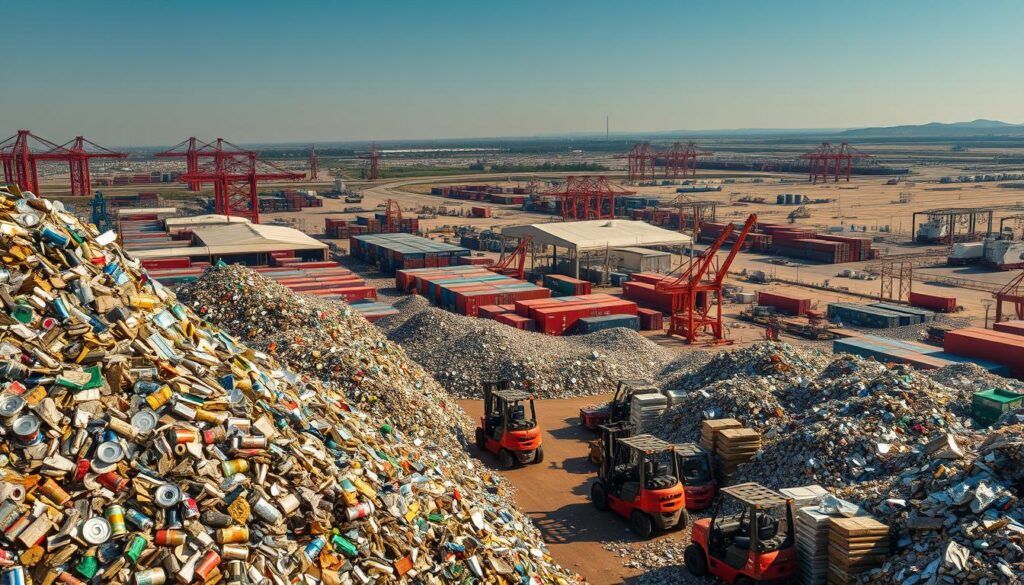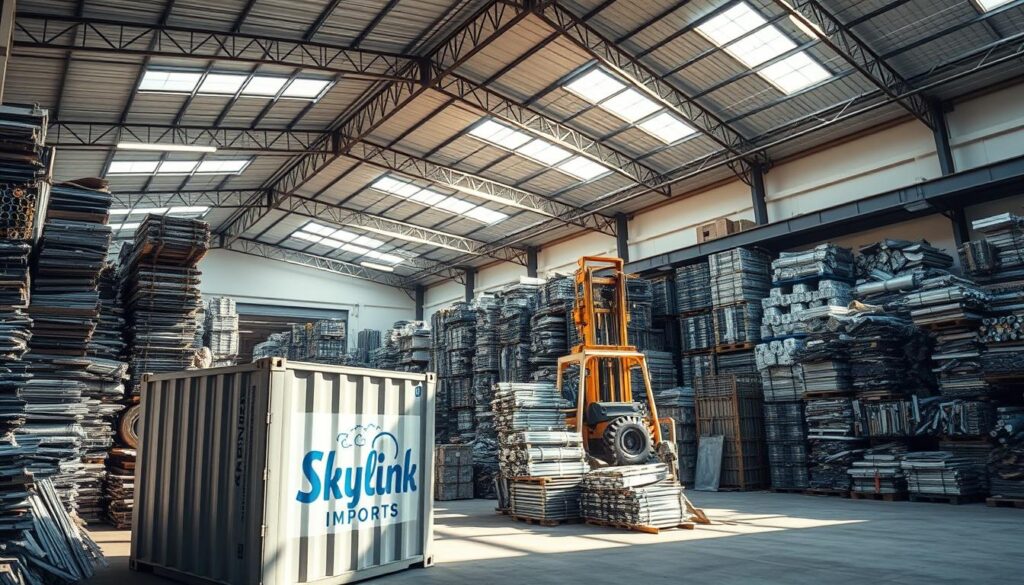
The aluminium recycling industry is booming, with aluminium scrap collection playing a crucial role in reducing waste and conserving natural resources. Did you know that recycling aluminium uses 95% less energy than producing primary aluminium?
Skylink Imports, a global import-export solutions provider, is at the forefront of this industry, bridging the gap between manufacturers and markets with unmatched efficiency, reliability, and transparency. By adopting best practices in aluminium scrap collection and selling, businesses can maximise their returns while contributing to a more sustainable future.
Key Takeaways
- Understanding the importance of aluminium scrap collection
- The role of Skylink Imports in global import-export solutions
- Best practices for maximising returns in aluminium scrap selling
- The environmental benefits of recycling aluminium
- How to get started with aluminium scrap collection
The Global Aluminium Scrap Industry: An Overview
Aluminium recycling has become a pivotal aspect of the global scrap metal industry, driven by economic and environmental considerations. The industry’s significance is underscored by its contribution to sustainable practices and resource conservation.

Economic Significance of Aluminium Recycling
Aluminium recycling plays a crucial role in the global economy by saving energy, reducing landfill waste, and conserving natural resources. The process requires 95% less energy than producing primary aluminium, making it an attractive option for manufacturers.
The economic benefits of aluminium recycling are substantial, with the industry generating significant revenue and creating employment opportunities worldwide.
Key Players in the Global Scrap Market
Major companies such as Skylink Imports are key players in the global aluminium scrap market, specialising in sourcing, procurement, and logistics. Other significant players include:
- Large-scale recyclers
- Metal trading companies
- Specialised scrap dealers
Current Market Trends and Statistics
The global aluminium scrap market is influenced by various factors, including market demand, raw material prices, and environmental regulations. Current trends indicate a growing demand for recycled aluminium, driven by the automotive and construction industries.
Some key statistics highlighting the industry’s growth include:
- A significant increase in aluminium recycling rates globally.
- Rising demand for recycled aluminium in manufacturing.
- Fluctuations in raw material prices affect market dynamics.
As the industry continues to evolve, understanding these trends and statistics is crucial for stakeholders to navigate the global aluminium scrap market effectively.
Understanding Different Types of Aluminium Scrap
Understanding the different types of aluminium scrap is crucial for effective collection and selling strategies. The aluminium scrap industry is complex, with various types of scrap that differ in their characteristics, applications, and market demand.
Classification Systems for Aluminium Scrap
Aluminium scrap is classified using various systems, including the Aluminium Association’s classification, which categorises scrap into different grades based on its composition and purity. Other classification systems consider factors like the scrap’s origin, form, and potential applications.
- Pure aluminium scrap
- Mixed aluminium scrap
- Coated or painted aluminium scrap
- Aluminium alloy scrap
High-Value vs. Low-Value Aluminium Scrap
The value of aluminium scrap varies significantly depending on its type and quality. High-value scrap includes pure aluminium or aluminium alloys with known compositions, which are highly sought after by recyclers. In contrast,low-value scrap may be contaminated, mixed with other materials, or of uncertain composition, making it less desirable.

Common Sources of Quality Scrap
Quality aluminium scrap can be sourced from various industries and activities, including:
- Manufacturing processes
- Construction and demolition waste
- Consumer electronics and appliances
- Automotive and aerospace industries
For more information on aluminium scrap collection and sustainable management practices, email us at info@skylinkimports.com.
Best genuine Practices for Collecting and Selling Aluminium Scrap in the world
To maximise profits in the aluminium scrap business, it’s essential to follow best practices for collection and sales. The aluminium scrap industry is built on several foundational practices that ensure sustainability, profitability, and compliance with global standards.
Industry-Recognised Collection Standards
Adhering to industry-recognised collection standards is crucial for maintaining the quality and value of aluminium scrap. These standards often involve:
- Proper segregation of different aluminium alloys
- Cleaning and decontamination of scrap
- Compacting and baling to increase density and reduce transportation costs
Ethical Sourcing Guidelines
Ethical sourcing is paramount in the aluminium scrap industry. This involves:
- Ensuring scrap is sourced from legitimate suppliers
- Verifying the origin of scrap to prevent illegal trading
- Maintaining transparency throughout the supply chain
For more information on ethical sourcing, you can contact us at +1 (403)266-9394 or +91-9041-543543.
Quality Control Measures
Implementing stringent quality control measures is vital for ensuring the scrap meets buyer specifications. This includes:
- Regular inspection of scrap for contaminants
- Using advanced technology for sorting and analysis
- Maintaining detailed records of scrap origin and processing history
Documentation and Traceability Systems
Effective documentation and traceability systems are essential for compliance and for building trust with buyers. This involves:
- Maintaining detailed records of transactions and material origin
- Utilising digital platforms for real-time tracking
- Ensuring all documentation complies with international standards
By implementing these best practices, businesses in the aluminium scrap industry can enhance their reputation, improve profitability, and contribute to a more sustainable future.
Efficient Collection Methods and Equipment
Maximising profits from aluminium scrap sales begins with efficient collection methods and equipment. Companies like Skylink Imports, with strong operational roots in India, have demonstrated the importance of robust collection infrastructure in the aluminium scrap industry.
Collection Infrastructure Setup
Establishing a comprehensive collection infrastructure is the backbone of any successful aluminium scrap operation. This involves setting up a network of collection points, partnering with local businesses, and ensuring that the necessary equipment is in place to handle the scrap efficiently.
Tools and Machinery for Efficient Collection
The right tools and machinery are crucial for efficient aluminium scrap collection. This includes vehicles for transportation, magnets for sorting, and balers for compacting the scrap. Investing in the appropriate equipment can significantly enhance the efficiency of the collection process.
Logistical Considerations for Scrap Yards
Effective logistical planning is essential for managing scrap yards. This involves optimising storage, streamlining the processing workflow, and ensuring that safety standards are maintained. By doing so, businesses can reduce costs and improve their overall operational efficiency.
Mobile Collection Solutions
Mobile collection solutions offer a flexible and efficient way to collect aluminium scrap, especially in areas where traditional collection methods are not feasible. These solutions can be particularly beneficial for reaching remote or hard-to-access locations.
By adopting efficient collection methods and equipment, businesses in the aluminium scrap industry can improve their operational efficiency, reduce costs, and ultimately maximise their profits.
Processing and Preparing Aluminium Scrap for Sale
In the competitive world of aluminium scrap trading, processing techniques play a pivotal role in determining profitability. Companies like Skylink Imports have set benchmarks in efficiency, reliability, and transparency, showcasing the importance of advanced processing methods.
Sorting and Segregation Techniques
Effective sorting and segregation are the foundation of aluminium scrap processing. This involves categorising scrap based on alloy type, size, and purity. Advanced sorting technologies, including magnetic separation and eddy current separation, can significantly enhance the quality of the scrap.
Key sorting techniques include:
- Magnetic separation for ferrous and non-ferrous metals
- Eddy current separation for aluminium and other non-ferrous metals
- Manual sorting for smaller or mixed scrap
Cleaning and Decontamination Methods
Cleaning and decontamination are crucial for removing impurities and enhancing the value of aluminium scrap. Techniques range from simple manual cleaning to advanced chemical decontamination processes.
Best practices for cleaning include:
- Removing dirt, oil, and other contaminants
- Using appropriate cleaning agents to avoid damage
- Drying scrap thoroughly to prevent corrosion
Compacting and Baling Processes
Compacting and baling are essential for reducing the volume of aluminium scrap, making it easier to transport and store. Hydraulic baling machines are commonly used for this purpose.
| Process | Benefits |
|---|---|
| Compacting | Reduces volume, easier transportation |
| Baling | Increases density, improves storage efficiency |
Value Addition Through Processing
By implementing efficient sorting, cleaning, compacting, and baling processes, businesses can significantly increase the value of their aluminium scrap. This not only enhances profitability but also contributes to the sustainability of the aluminium recycling industry.
Following scrap metal recycling best practices and incorporating top tips for selling aluminium scrap can make a substantial difference in the competitiveness of a business in this sector.
Navigating the UAE and Global Aluminium Scrap Market
The UAE’s strategic location and business-friendly environment make it an attractive hub for aluminium scrap trading, but success requires a nuanced understanding of the market. Companies like Skylink Imports, headquartered in Calgary, have shown interest in global markets, including the UAE.
Price Determination Factors
Price determination in the aluminium scrap market is influenced by several factors, including global demand and supply, the price of primary aluminium, and regional market conditions. Understanding these factors is crucial for making informed decisions.
Market Fluctuations and How to Respond
Market fluctuations can significantly impact the profitability of aluminium scrap trading. To respond effectively, businesses must stay informed about market trends and be prepared to adapt their strategies accordingly.
Opportunities in the UAE Scrap Market
The UAE offers numerous opportunities for aluminium scrap trading due to its growing industrial sector and strategic location. Businesses can capitalise on these opportunities by understanding local market dynamics and regulatory requirements.
International Trade Considerations
Engaging in international trade requires an understanding of global market conditions, trade regulations, and logistical considerations. Businesses must navigate these complexities to succeed in the global aluminium scrap market.
By understanding the intricacies of the global aluminium scrap market and leveraging opportunities in the UAE, businesses can achieve success in this dynamic industry.
Strategic Approaches to Selling Aluminium Scrap
Effective sales strategies are crucial for maximising profits from aluminium scrap sales. In the competitive aluminium scrap market, sellers must adopt a multifaceted approach to stay ahead.
Building Relationships with Buyers and Recyclers
Establishing strong relationships with buyers and recyclers is fundamental. Companies like Skylink Imports, which specialise in sourcing and procurement, often prioritise building long-term partnerships with reliable suppliers.
Negotiation Strategies for Maximum Profit involve understanding market dynamics, being aware of the buyer’s needs, and being flexible. Sellers should be prepared to negotiate prices based on the quality and quantity of the aluminium scrap.
Direct Sales vs. Working with Intermediaries
Sellers must decide whether to engage in direct sales or work with intermediaries. Direct sales can increase profit margins, but intermediaries can provide valuable market access and logistical support.
Digital Platforms and Modern Selling Channels
The rise of digital platforms has transformed the way aluminium scrap is sold. Online marketplaces and trading platforms offer new avenues for sellers to reach a broader audience, enhancing their chances of securing better deals.
Embracing ethical scrap metal trading practices not only ensures compliance with regulations but also enhances a company’s reputation, potentially leading to more lucrative opportunities.
By adopting these strategic approaches, sellers can improve their competitiveness and profitability in the aluminium scrap market.
Sustainability and Environmental Compliance
As the world shifts towards more sustainable practices, the aluminium scrap industry plays a crucial role in reducing environmental impact. The industry’s commitment to sustainability is not only beneficial for the environment but also enhances its reputation and compliance with global standards.
Environmental Benefits of Aluminium Recycling
Aluminium recycling offers significant environmental benefits, including energy savings and reduced greenhouse gas emissions. Recycling aluminium uses 95% less energy than producing primary aluminium, making it a crucial component in the fight against climate change.
The environmental benefits of aluminium recycling can be further understood through the following table:
| Environmental Impact | Primary Aluminium Production | Aluminium Recycling |
|---|---|---|
| Energy Consumption | High | Low |
| Greenhouse Gas Emissions | High | Low |
| Resource Conservation | Limited | Significant |
Sustainable Collection and Processing Practices
Sustainable collection and processing practices are essential for minimising the environmental footprint of the aluminium scrap industry. Skylink Imports is committed to reliability and transparency in its operations, ensuring that all scrap is handled in an environmentally responsible manner.
Environmental Certifications and Standards
Adhering to environmental certifications and standards is crucial for demonstrating the industry’s commitment to sustainability. Companies like Skylink Imports strive to meet or exceed these standards, ensuring best practices in aluminium scrap management.
Corporate Social Responsibility in Scrap Trading
Corporate social responsibility (CSR) plays a vital role in the aluminium scrap trading sector. By embracing CSR, companies can contribute to sustainable development while enhancing their brand reputation.
In conclusion, the aluminium scrap industry must continue to prioritise sustainability and environmental compliance to ensure a greener future. By adopting best practices and adhering to environmental standards, companies can make a significant positive impact.
Conclusion: Maximising Success in the Aluminium Scrap Business
Implementing the best genuine practices for collecting and selling aluminium scrap in the world is crucial for maximising success in this industry. By understanding the global aluminium scrap market, adopting efficient collection methods, and processing scrap effectively, businesses can capitalise on the growing demand for recycled aluminium.
Skylink Imports plays a vital role in facilitating global trade by providing comprehensive import-export solutions. Their expertise can help businesses navigate the complexities of the aluminium scrap market, ensuring compliance with environmental regulations and sustainability standards.
To stay competitive, companies must focus on building strong relationships with buyers and recyclers, while also adopting strategic approaches to selling aluminium scrap. By doing so, they can improve their profitability and contribute to a more sustainable future.
For more information on how to optimise your aluminium scrap business and explore global trade opportunities, visit Skylink Imports.
Email us: info@skylinkimports.com
Contact us: +1 (403) 266-9394, +91-9041-543543





